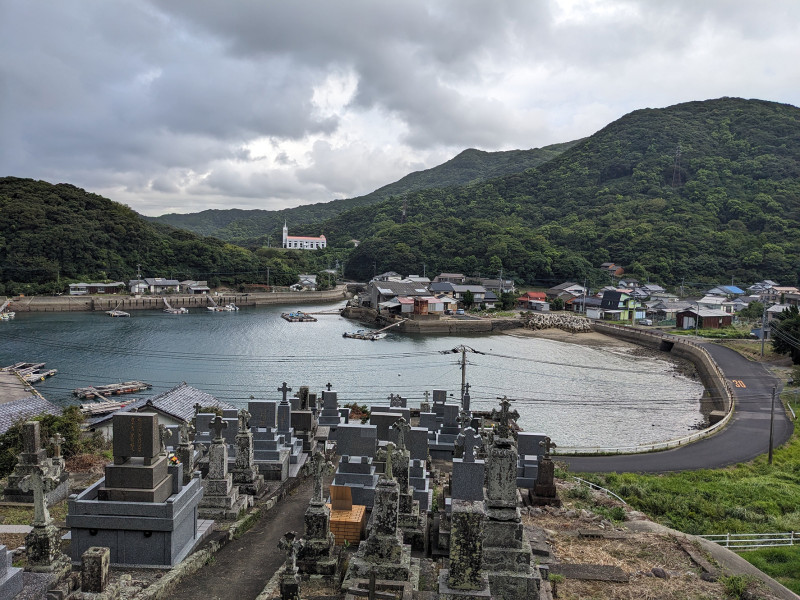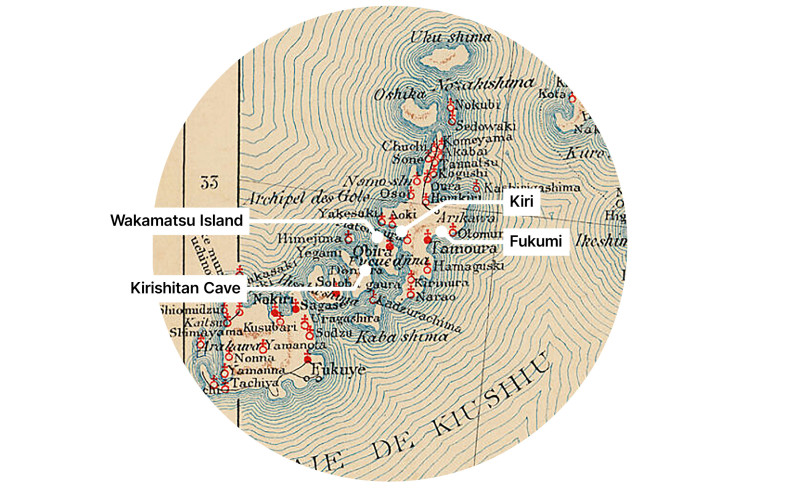
Ozaki Natsuki
The Name is the Lead

Date:
2 December 2022
Location: Arikawa, Nakadōri Island, Upper Gotō, Nagasaki Prefecture
Excerpt Length:
Approx. 11 minutes, 30 seconds
Participants:
Interviewer:
Gwyn McClelland (GM)
Interviewee 1:
Ozaki Natsuki 小崎なつき (pseudonym) (ON)
Born Wakamatsu Island, Shōwa 51 (1976). 46 years old at time of interview.
Below is the transcript plus audio of an interview recorded on the Gotō Islands. Oral history consists of spoken memory. As it is personal opinion it is in no way intended to present the final verified or complete narrative of events. You are free to use the material in this transcript for research and study, education, other non-commercial or non-public purposes. You must not at any time do, permit, or authorize any act that infringes the copyright in the material. (e.g. By reproducing, publishing, performing, communicating, adapting, or entering into a commercial rental arrangement, or authorizing a third party to do any of those things). Requests for further rights in respect of the materials (such as a right to publish, reproduce, broadcast or perform) may be made to Japan Past & Present.
English Transcript
To switch to the Japanese-language transcript, toggle the EN/JP option in the webpage's main menu.
[Section 1: Spirituality]
Gwyn McClelland
And what about spirituality, or maybe of the "spirit" – um, er, as you are a Catholic, do you have an interest in these?
Ozaki Natsuki
Yes, I do. I did not used to, but, after all, my father and mother were actually themselves descendants of the Sempuku Kirishitan who immigrated from Sotome, and were Catholic, or Kirishitan. So, bit by bit, as I am doing my job as a guide, in amongst that work, I got to understand my "roots" – as I did it [my job], to gradually, [come to] understand my ancestor's way of life, and my own way of life was influenced [you could say], or, [because I am] wanting to be like my ancestors, I am influenced quite a bit. It has forced me to think about it [spirituality].
Gwyn McClelland
Ah, I see. Thank you very much.
[Section 2: A Pejorative Name]
Ozaki Natsuki
Before I was married, my name was "Shimomine."
Gwyn McClelland
Shi-mo-mi-ne.
Ozaki Natsuki
es, and the "Shimo" in Shimomine is the character for "underneath," you see. And so this, the thing is that after beginning the Meiji era, at the time when commoners were also able to receive a family name from the officials, it was a name used to give [my family] a discriminatory meaning – which I found out later, and at first I wasn't that… of course, as for feelings and image, it was pejorative, so there was not really that much of a shock, but [GM: Right yes] when I became a guide, [I was like] there was this person who told me, "Aha, so that use of the [character] shimo (underneath) was because your ancestors were Kirishitan, wasn't it!" Therefore, with that, we have evidence and so, for myself, when I met someone who said you could see it as a point of pride, hearing that, and ah, then, in a way, by moving on forwards, you can live, or find a way of living, and so, for example, there was persecution and discrimination, and so, for these, what you would call sad things, that painful history that [my family] managed to get over, you could say it was a driving force! So, when I heard that person tell me that, it really made me think hard…
And, ahh, the thing is that when the Nagasaki World Heritage was to be ratified, I wasn't so much opposed as, a little, basically my heart was quite unsettled at the time, and truly, [I wondered] what was that? Because, there were people who were worried that many people would come to the churches that were still in use, and so there might be more "troubles" and so, it was with very complex feelings that I watched as the World Heritage [sites were ratified]. And I had watched that going on, and then among all of that I thought about that person [who had talked about her discriminatory surname] and I thought, right. That is the case. In the past, that happened, and the discrimination of the official, I can turn into a "treasure," I understood, and along with my [new] job I made up my mind that I could "step-by-step move on," I guess you could say. So, that was really, just like a turning point for my work as a guide, due to my surname… It became, you could say, my own, for example, my own roots or, a [significant] part of history, that could become more and more deeply [thoughtful], with deep meaning, something I had come to think about, I believe.
Gwyn McClelland
Yes, I see. It gradually became more and more a point of pride, didn't it?
Ozaki Natsuki
Yes, that's right.
Gwyn McClelland
And then the World Heritage happened in 2018, and so your consciousness came to change after that?
Ozaki Natsuki
That's right. In that year. It was really made public dramatically, and lots of people turned toward Gotō, or the history of Christianity in Nagasaki and began turning their eyes towards the churches, with a lot of different purposes, really a lot of people started to come here, and truly the number of visitors have increased, and, yes. And, at the time, really for myself, my way of examining my heart had begun to change, or had already changed, I think. Truly, I tell many guests about my own family name story and then they are always really moved on my behalf. There are a lot of people like that, which is a huge plus.
Gwyn McClelland
Yes, that is fascinating.
Ozaki Natsuki
Yes, I had come to be able to think about it.

[Section 3: The Ancestor in Urakawa's book]
Ozaki Natsuki
So, in the third year of Meiji, therefore, 1870, [my ancestor] Mineshita Jōhachi, okay. At the time it is true that there was actually no capture [of the Kirishitan] however, but, but, in the area the organizing official [called a mako gashi – or kogashira], who did certain roles in those days had a plan to loot [my ancestor's village] and spread untrue information like: "It would be better to run away or maybe you will be captured!", spreading lies and when my ancestors heard it, that old family, made up of around fifty people, emptied out, you could say, or went to escape, they escaped, and then when they returned, the village had been completely plundered, and there was nothing left. And again, starting at one, or actually starting from nothing! … they had to reclaim it … is the story that is written [in Urakawa] and I did not know…
Gwyn McClelland
The literature – what is the literature called?
Ozaki Natsuki
I have a copy of it, it is in this book, the Gotō Kirishitan shi.
Gwyn McClelland
Ah, I have a copy in Australia.
Ozaki Natsuki
The story appears in the part of the story called Fukumi [a placename]. Here, it is in the part of the story called Fukumi.
Gwyn McClelland
From page 160, or 168?
Ozaki Natsuki
From 168, yes, that is it. 160, ah, it is on page 170
Gwyn McClelland
Ah, page 170. Right. Thank you.
Ozaki Natsuki
It was my father's ancestor but, and, and this was ah, what would you say? It was in this book. I only heard from my father "He's in there!" that my grandfather's name was in the story. So, by myself, when I came to looking at it, it was that kind of [dark] story! In other words, the Kirishitan, what would you say? So, you can see it from the perspective of discrimination, comparatively, as they were Kirishitan, they did not treat them in a… human way, and depending on the person, some people would consider it as not very bad, that way to say looting was carried out, comparatively but because the name of that person was there, maybe he didn't want to really know about this information, because it was this kind of [horrible] content, my father wasn't forthcoming – he just said the name was there, but did not say anything else in terms of details about the story I think, yes. Really for a long time, it [contributed] to an important consciousness [for myself] I think, yes, yes.
Really, for such a long time, there was a "discrimination consciousness" about the Kirishitan… you really would have to say. During the period of persecution, it had been fostered, yes, however…
Gwyn McClelland
Really, it was zero? when they came back there was nothing so from zero…?
Ozaki Natsuki
Yes, yes, exactly.
Gwyn McClelland
So that was in the 1870s. After that, I guess they didn't have much?
Ozaki Natsuki
Yes, the 1870s, and that's right, yes.
It is written that they used chawan bowls [for miso soup] to dig in the field and plough…

[Section 4: Kiri and the Caves]
Ozaki Natsuki
On Kamigoto, when you speak about the Gotō Kuzure [Gotō Persecution], then a place called Kiri is often…, and the Kirishitan caves are often… ah [mentioned]
Gwyn McClelland
Really? Kiri and…
Ozaki Natsuki
I have a map... Ah, let me see. This is the Gotō Islands map, and…
Gwyn McClelland
Right, right.
Ozaki Natsuki
It is a little to the south, in this area is where the place called Kiri is. And it was the same here… Within Gotō Kirishitan history it was in the first year of the Meiji era, 1868, in September. and here there is a story about how the Kirishitan were captured and tortured.
Gwyn McClelland
Aha, aha.
Ozaki Natsuki
Yes, and hearing this, in that Wakamatsu Island at a place called Sato-nōra, the Kirishitan they talk about a bit of a large cave on the southern part of the island,
Gwyn McClelland
I see, a cave. Yes.
Ozaki Natsuki
Yes. Now, near the opening to that cave a large statue of Christ has been erected.
Gwyn McClelland
Right.
Ozaki Natsuki
And that is where they hid. They fled from the danger here and stayed hidden for about four months.
And then in the fourth month, there was a fisherman who went past that way and noticed the smoke, and after they were reported on, they were tortured with sangiseme torture, and there was no one who died, but some whose legs became disabled [as a result], and so on. Yes, and as I was saying before for me that "shimo" [language]. My family name that had "shimo/shita" characters, they were used in a pejorative way. And, however, that person who said to me that "shimo" used in your surname could also become something you are proud of - they also had a great-grandfather who was captured here [at the cave].
Gwyn McClelland
Wow. Ah, I see. Is that right?
Ozaki Natsuki
And so, that is what that person told me. No, the thing is that [for that person] and their self confidence as a child, well, Catholic people in the past, they were very poor. They were poor and as a result of that poverty, they were bullied/teased and that was the situation. And so, bullying because you were Catholic, "Yaso Yaso" (Jesus, Jesus) [they were called] and even having had that experience, being able to tell of their faith they showed pride, and so "The use of Shimo for your family name, you could be proud of", is what that person told me, having had their great grandfather captured here [in these caves]. And so, with that, it connects in…[to my understanding of my own identity]
[End of Interview Excerpts]
Suggested Citation:
Ozaki, Natsuki (pseudonym). "Ozaki Natsuki: The Name is the Lead." By Gwyn McClelland. Hidden Christian World Heritage in the Gotō. Japan Past & Present (2 December 2022).